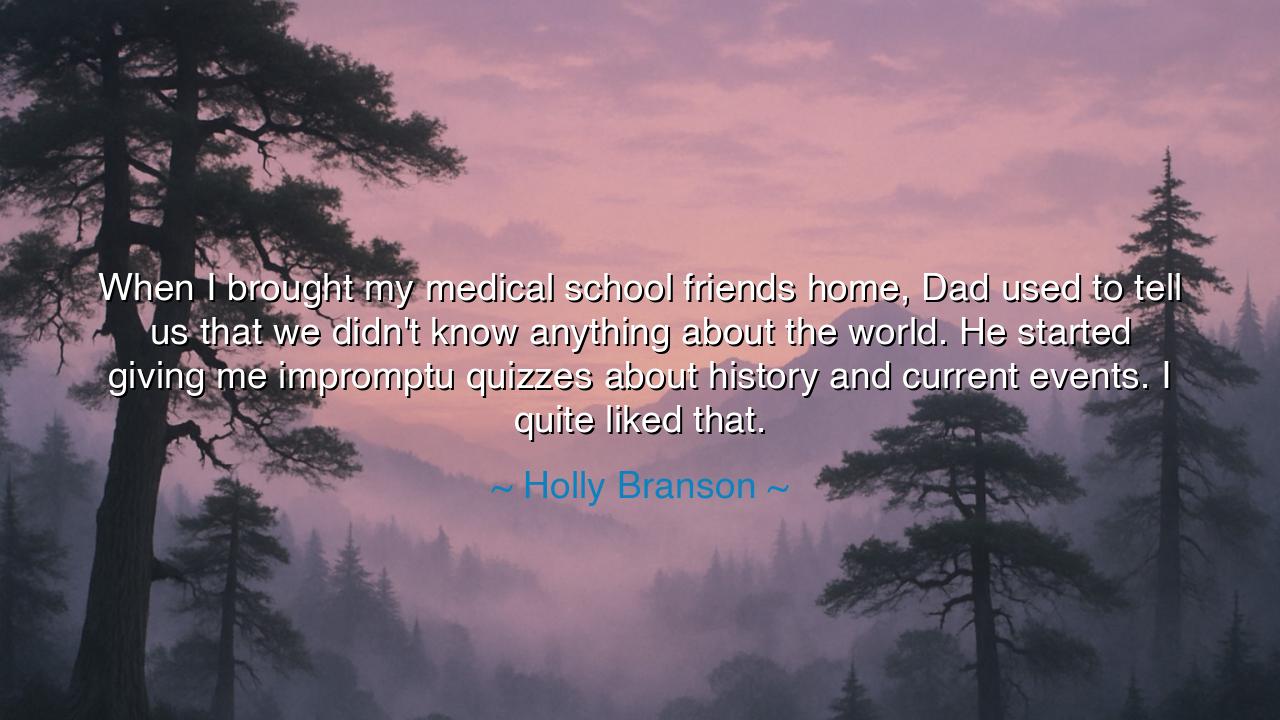
When I brought my medical school friends home, Dad used to tell
When I brought my medical school friends home, Dad used to tell us that we didn't know anything about the world. He started giving me impromptu quizzes about history and current events. I quite liked that.






The words of Holly Branson carry the gentle weight of both affection and awakening: “When I brought my medical school friends home, Dad used to tell us that we didn’t know anything about the world. He started giving me impromptu quizzes about history and current events. I quite liked that.” Though spoken with warmth, her reflection reveals a profound truth—that true wisdom extends far beyond the walls of academia. Her father’s lesson was not a rebuke, but a gift: the reminder that intellect, however refined, must be tempered by understanding of life, people, and the ever-turning world. For knowledge that is confined to one realm becomes narrow, while wisdom that draws from all things becomes whole.
The medical student, steeped in anatomy and science, learns the mysteries of the body—but her father’s words invite her to see the greater anatomy of the world itself. To know the pulse of society, the heartbeats of nations, the rise and fall of ideas—this, too, is a kind of medicine. A healer who knows only the flesh can mend wounds, but a healer who understands the human story can mend spirits. Thus, Holly Branson’s quote becomes a parable for all who devote themselves to study: that the scholar’s lamp must not light only the page, but the path that leads into the broader world.
The image of her father quizzing her on history and current events speaks to an ancient principle long treasured by philosophers: that education must be both deep and wide. In the days of old, the sages of Greece and the scholars of the East sought to master many disciplines, believing that truth is a river fed by many streams. To study medicine without history is to forget the story of suffering that birthed it; to know science without humanity is to risk coldness of heart. Her father’s challenge was not to diminish her learning, but to expand it—to remind her that intellect alone cannot grasp the full measure of life’s tapestry.
Consider the story of Hippocrates, the ancient father of medicine. Though revered as a physician, he was also a philosopher, a student of ethics, and an observer of human nature. He taught that to treat the body, one must first understand the soul—that disease arises not only from the imbalance of humors, but from the imbalance of life itself. His wisdom lived at the crossroads of art and science, history and observation, reflection and practice. Branson’s father, like Hippocrates, urged her to see that to know the world is to treat it—to understand that every patient is shaped by culture, history, and circumstance, not biology alone.
There is humility in her recollection—“we didn’t know anything about the world”—and that humility is itself a mark of learning. For the wise know that knowledge is a mountain without summit, and the climb never ends. The father’s impromptu quizzes were not lessons in trivia, but exercises in perspective, teaching her to think beyond the borders of her expertise. In this way, Branson learned that true education is not about mastery, but curiosity; not about answers, but the courage to keep asking questions. The joy she expresses—“I quite liked that”—reveals the beauty of that awakening: the delight of discovery beyond the familiar, the wonder of realizing how vast and interconnected the world truly is.
Her story also speaks to a universal truth about mentorship and parenthood. The role of a father—or any teacher—is not to provide comfort, but to provoke growth. The challenge her father offered was an act of love: a call to rise above the narrow confidence of specialization and embrace the broader horizon of understanding. In every age, the great teachers have done the same. Socrates asked questions that unsettled; Confucius taught that to govern others one must first learn the history of men’s hearts; and every wise parent, in their own way, has asked the child to see the world not as it is taught, but as it lives and breathes.
So, my child of knowledge, take this lesson to heart: study deeply, but never narrowly. Learn your craft, but also learn the story of humankind. Read of history, listen to current events, understand how the pulse of the world beats alongside your own. Whatever your path—be it medicine, art, or law—remember that your knowledge is only as strong as the wisdom that guides it.
For in the end, Holly Branson’s words remind us that the greatest education is not found in textbooks, but in the living world—its struggles, its stories, its ever-changing truth. Let every conversation be a lesson, every journey a classroom, every question an opening to something greater. And if ever you think you know enough, recall the voice of her father, smiling and wise, asking you one more question—not to test what you know, but to awaken what you have yet to learn.






AAdministratorAdministrator
Welcome, honored guests. Please leave a comment, we will respond soon